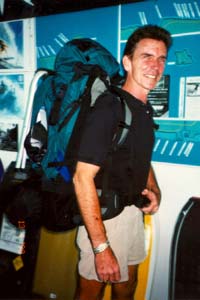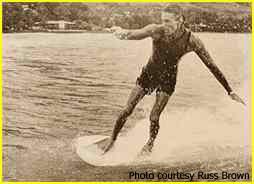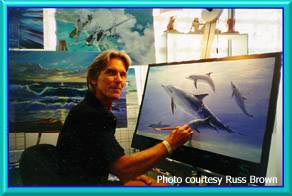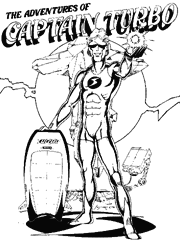Goodbye Captain Turbo (all other photos/images courtesy Russ Brown) In 1983, Russ Brown rocked the bodyboarding industry by providing a viable alternative to the colossal Morey Boogie empire--a stiff board that could be custom tailored to suit your riding preferences. Fast-forward to 1998. Though interest in the industry is higher than ever, bodyboarding is currently experiencing its worse sales slump in its history. This year, one of bodyboarding's most vocal proponents is calling it quits. I got a chance to interview Russ Brown (aka Captain Turbo) of Turbo Surf Designs Hawaii on 4/13/98 at his Honolulu shop, just one month before his scheduled departure. He had some really insightful words about the industry, and about life in general. NM: Say it ain't so, Russ? What's happening? RB: Well, we're getting ready to sell Turbo to a new owner, so that Captain Turbo can take off on a grand adventure. People are asking me where I'm going--the best answer I can give you is: starting from Las Vegas, I'm going to wander into the wilds of northwest Arizona, and then just likely work my way up to Montana. Where do I go from there? Who knows... but it'll be another journey. NM: So what's going to happen to Turbo? RB: Well, a lot of things crossed my mind when selling Turbo, one of which was, if we sold it to the wrong party, whether an outside foreign influence, or somebody who didn't understand the nature of the business, you'd walk into Turbo and what would you find? You'd find surfboards, bikinis, you name it. But bodyboarders need a place of their own. Part of the sales was to find the right owner to continue the tradition. NM: Did you find the right buyer? RB: I think I have. The manager of Turbo Motor Sports, a young lion who sees the world and realizes that there are great opportunities. So it'll be locally-owned by people in Hawaii by people who surf and should stay in the same location, although there's talk that it may be moved to a newer, even better location. The key question is whether Turbo's (the line of bodyboards) will continue to be made. Right now it looks like that would be the case, but as to what price, I don't know. It's just, once that Captain Turbo leaves, anything could happen. So if you want a Turbo, don't wait too long. NM: I can't believe you are leaving after all these years. I actually bought a custom board from you back in 1984. I think you were like one year in existence?
To this day, people who have never tried say that they have weird shapes. But instead of copying other people, Turbo always set its own course. My attitude was that Turbo was "The Ultimate Russ Brown Obsession" (T-U-R-B-O). It's my board--what will make it go faster, do more than what other people have? Graphics, of course was a major part of it and Russ gave the world some "soul" boards; you could have a piece of the ocean that you could carry around. So you never really approach it as (copying) how other people make it, but rather how to make it right. NM: Now, we know that you are leaving, but the question is why? Is there a reason, any hidden frustrations? RB: We remember the famous words of Frank Sinatra, always leave the party when you're having fun. I got into the bodyboard business; I blinked an eye and it's fifteen years later. Sometimes people expect you to be something you really aren't. In this case, Captain Turbo's an entrepreneur and he always likes starting new things. When business becomes just a business, then it's time for a certain type of businessman to come along and run it like a regular business. But Turbo's never been that way. But you look a number of things--the economy in Honolulu has dropped precipitously and will continue to do so until the bottom is reached. The sport of bodyboarding is at a critical juncture with sales has dropped worldwide, and yet more people are coming into the party. But on Russ's personal side, believe me, when you turn 50, believe me, you'll start looking at things differently. NM: So is this sort of like a midlife crisis for you? RB: You can call it that, except, I'm single, so I can make these radical changes. But part of me has always wanted to go and be away from things. And instead we're sometimes drawn right into the limelight. But, you gotta follow that voice that's inside of you. So, I went to Las Vegas in November, saw a world that just drew me into it. Ever since then I decided it was time to move on. But I love the ocean--I've surfed since 1963. So, after 30 years of surfing, you realize that sometimes you take it for granted. But I like the water. Whether it's freediving or surfing or bodysurfing, there's all sorts of things you can do out there. Life is more than bodyboarding, but bodyboarding can be an important part of your life. So as we leave bodyboarding, it's like, good luck to everybody. I've met some real good people over the years. And we want to thank all those people for their help. The bodyboard business, as I said before, has dropped. And a lot of people are questioning where it's going, what it's going to do. Well, the funny thing is, when sales dropped, new ideas come forth, because you need something to make that sale. So sometimes, just like Turbo got creative because of the need to create something to increase sales, that's the way to come up with new ideas and new ways of doing things. I think what we look at bodyboarding today will change, except the shapes have basically reached the point where they have leveled off--everybody accepts a certain length, width, thickness and certain look to boards. The days of the pioneers, I hate to say it, are kinda over. People are locked into the attitude that that's the sport of bodyboarding. But, we shouldn't forget the pioneers such as Jack Lindholm, Tom Morey. They deserve much more respect than they get sometimes. But we all have to get off the stage like the Rolling Stones, and let the new people get on the stage and do their thing. So the industry is faced with these new players that want to play their music/make their boards. Sorry, gotta let them do it; can't stop them. But hey, I've been doing bodyboards for 10/15 years. But hey, there's people out there with fresher ideas, and they will get in whether you like it or not. NM: So, will you ever be coming home, Hawaii, that is? RB: I came to Hawaii from Vietnam as a transitory point where I've suddenly found myself staying for 28 years. I'd rather doubt we'll come back this direction. But home is where your heart is. Through your life you'll see that things change in ways you wouldn't believe, like this beautiful young lady right here (referring to my fireball daughter who is getting into the display cases, trying on Russ's puka shell necklaces).
NM:
I kinda want to leave with the thought that Mother Ocean gives the waves to all for free. We should be thinking everytime we go out what we could do for Mother Ocean in return for these gifts. NM: Good words. What would you like to say to bodyboarders and the bodyboarding industry in general? RB: The sport is being used and abused and taken advantage of by things that are going on that everyone has to be made aware of. If we look at the bodyboarding magazines, which is the nucleus of the sport--take a look at a 1985 magazine. The sport was growing, it was booming. Now it's (the magazine is) just a little too thin to my liking. What you see happening is that stores that are selling bodyboards are not part of the industry--they are not committed to helping the sport, they are just selling the product. So the buyer gets the board at a cheap price, but in a way you are only hurting yourself when you buy a board from someone who doesn't advertise in the magazines. But guess what, most of the stores who sell bodyboards are also selling surfboards and you kinda know that they're not going to advertise because it would hurt their surfboard image. For the sport to progress, the riders have to realize that where you spend the money is very important. For the sport to grow, people must be able to make money, whether it's the writers, the manufacturers, the magazines, the video producers. Right now it's very tight out there. How could you possibly tell your parent you want to be a professional bodyboarder--there's no money. If everybody gets involved with this, and spends the money in the right locations, it would help everybody. Right now there are more pros than the industry can possibly support. The sport will continue because it's a person going out to the ocean to have fun. But I've never forgotten what Tom Morey said. He didn't start off by thinking about terrorizing the ocean, ripping, slashing. His whole point was here's a new way to have and I quote, "flexible fun in the water." And it seems like a lot of people have forgotten the fun part with who's sponsor's jerseys I'm wearing and how radical was that turn. But sometimes just pulling a person off the beach and going, "Hey, have you ever bodyboarded? Let me show you how much fun it is," instead of "Hey, look how cool I am." Think about that. One other thing the sport has to realize is that the magazines do guide the sport, and the editorial content should not be laughed at, but really looked at carefully. Over the last year, I've seen magazines come down on foreign riders, degrading women, etc., etc. Is the sport headed in the right direction? I don't want to see it heading in the wrong direction or go the skateboard look. The sport is for everybody--it's not just for one person, one race. It needs to be shared. Everybody's looking for a new sponsor to come in and make things happen, but be careful if you sell out the soul of the sport, and it's now owned by (say) "Pepsi World Cup of Bodyboarding," and they dictate how things are done. There's people out there like Carol Philips who bust their butt to put things on with very little support; everybody needs to stop and think where they want the sport to go. And for that interest to get involved.
So I'm going to say aloha to Honolulu, with a smile on my face. Hey, just go surf and have fun. I'm off on my adventure to go look for gold and who knows what else. I'm going by myself--it'll be an adventure and a challenge. But guess what, if you do surf that challenge in front of you, then suddenly your mind is energized. There's a big world out there, and I'm going to go look at it.
|

 RB: Well, remember that the history of Russ Brown is the neverending saga of going from one thing to another to satisfy his cravings of obsessions that he has. I started with silkscreening, then moved to waveskis, then softskis which then segued into (bodyboarding company) Scott Hawaii getting involved in the business. I also dealt in motorsports equipment and model plane parts. Turbo Surf Designs started in 1983 as a design exercise to make surf equipment. We realized that bodyboards back then were just flexible piece of foam. Having ridden paipos (paipo boards) at The Wall, right away I knew the boards should be stiffer, and if it was stiff, then you could put skegs on them. So began the line of Turbos.
RB: Well, remember that the history of Russ Brown is the neverending saga of going from one thing to another to satisfy his cravings of obsessions that he has. I started with silkscreening, then moved to waveskis, then softskis which then segued into (bodyboarding company) Scott Hawaii getting involved in the business. I also dealt in motorsports equipment and model plane parts. Turbo Surf Designs started in 1983 as a design exercise to make surf equipment. We realized that bodyboards back then were just flexible piece of foam. Having ridden paipos (paipo boards) at The Wall, right away I knew the boards should be stiffer, and if it was stiff, then you could put skegs on them. So began the line of Turbos.
 RB: I know I'll miss the ocean, but I've been so busy the last few years that I haven't had the chance to really get back into the ocean. The ocean is water, but it's just salty water. Where I'm going, there'll be other types of water. As a matter of fact the ocean was there (in the desert) millions of years ago--I'll just see another part of the ocean and what it did to the world around it.
RB: I know I'll miss the ocean, but I've been so busy the last few years that I haven't had the chance to really get back into the ocean. The ocean is water, but it's just salty water. Where I'm going, there'll be other types of water. As a matter of fact the ocean was there (in the desert) millions of years ago--I'll just see another part of the ocean and what it did to the world around it.
 As with any industry, there are good products and there are so-so products. Of course we're going to see a lot of people that'll buy things just because of hype. But if they got a little more interested, they'd realize where their money goes. I kinda think that products made by real surfers will always be superior to the cheaper products made by people who don't surf. Which companies those are, well you would have to do some investigating, but the closer the manufacturer is to the water, the more likely he surfs.
As with any industry, there are good products and there are so-so products. Of course we're going to see a lot of people that'll buy things just because of hype. But if they got a little more interested, they'd realize where their money goes. I kinda think that products made by real surfers will always be superior to the cheaper products made by people who don't surf. Which companies those are, well you would have to do some investigating, but the closer the manufacturer is to the water, the more likely he surfs.